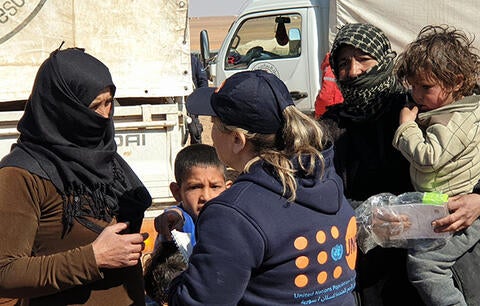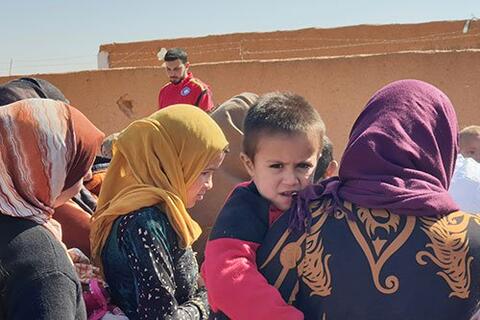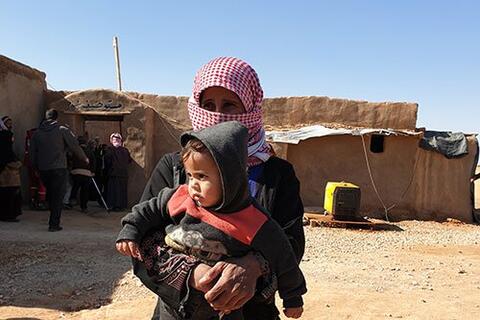
conditions are dire. © UN in Syria
RUKBAN, Syria – As part of the largest-ever humanitarian convoy by the United Nations and the Syrian Arab Red Crescent, UNFPA has delivered critical reproductive health supplies, hygiene and dignity kits to women and girls in the remote Rukban area of South-east Syria.
Some 118 trucks brought life-saving assistance to the makeshift settlement, where more than 40,000 people are stranded in the desert.
“The situation here is extremely dire,” said Dr. Ameera Ahmad, a UNFPA gender expert who served on the convoy. “It’s very cold and people are living without basic needs.”
Rukban, which sits at the border with Jordan, was cut off from humanitarian relief for most of 2018. A convoy and assessment mission last November brought the settlement its first humanitarian supplies in nearly a year.
The residents there have been stranded for years, and the prolonged displacement has taken its toll.

“Life is unbearable here,” Leila, a resident, told a UN official. She fled the Islamic State of Iraq and the Levant (ISIL, also known as ISIS) four years ago and had her youngest child in the Rukban.
Basic food items are supplied by smugglers at hefty prices, people reported. Leila said there is little she can afford in the makeshift market.
Families described resorting to desperate measures, including forgoing essential health care to afford food. “One of the women in the camp told me that she can’t bring her child for a $2 injection because then the whole family will have to go without a meal,” Dr. Ahmad reported.
Protection issues paramount
The deprivation has forced some girls into child marriages.
“There are phenomena spreading such as child marriage,” Dr. Ahmad explained. “When we ask the parents, ‘Why are you forcing your daughters to get married?’ they always reply that it is to protect her or because of the poverty, that they can’t feed the whole family.”
Residents say gender-based violence, sexual exploitation and abuse are all major concerns. The harsh environment has exacerbated the suffering.
“This winter is so cold for everyone, especially the little children. I cried for their suffering these past months,” Leila said.

Critical supplies
UNFPA delivered reproductive health kits to help pregnant women safely give birth, supplies to treat sexually transmitted infections, kits for pregnant and breastfeeding women, as well as post-rape treatment kits for survivors.
UNFPA has also provided dignity kits, which contain essential hygiene items including sanitary napkins, as well as winter supplies.
During the mission, UNFPA also consulted with residents about their needs. “We had the opportunity to assess the situation of people in the camp closely, their needs and suffering,” Dr. Ahmad said.
Much more assistance is needed.
“I saw in Rukban an unfolding public health disaster,” said UNFPA’s Representative in Syria, Karen Daduryan. “Without a single doctor in the entire settlement, the population of 40,000 people are relying on nurses, many of them uncertified. We need to bring doctors and health services, including reproductive health care, and provide basic equipment and supplies, as well as establish a viable referral mechanism inside Syria for critical cases.
“While the convoy successfully delivered much needed assistance to people in need, a durable solution must be found as the aid only serves some of the needs for a limited time. Sustained access to continue the delivery of humanitarian assistance is absolutely vital for the Rukban residents.”



